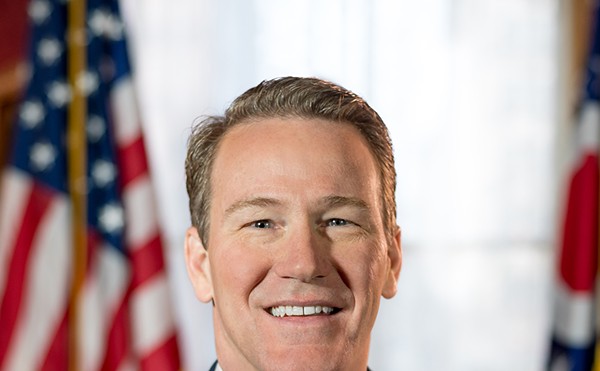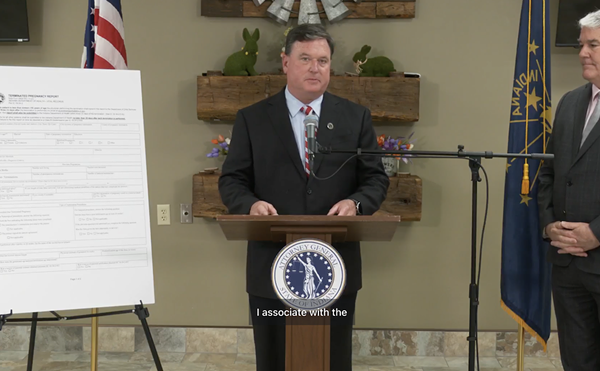Ten days into a new year, I'm as pleased as anyone to see 2001 in my rearview mirror. It was a tough year that left Cincinnati — and anyone who cares about this city — in a tough spot.
From the events of 2001, it's clear Cincinnati faces fundamental problems and challenges that go to the core of who we are and what we believe in. Just as clearly, solutions and new directions remain elusive.
Questions and concerns hover over us like a grey winter cold front.
From April's events: Is death the appropriate punishment for running from police? Can the police and the public, particularly African Americans, learn true respect for each other? Is the racial, social and economic divide in Over-the-Rhine salvageable? Was the shooting of Timothy Thomas by Officer Stephen Roach — generally known as a good cop — the real problem or just a symptom of larger problems?
From September's events: What's the price and value of safety?
Does the Constitution have to be killed in order to save it? Must we be suspicious of everyone different than us? Can we gaze away from our own bellybuttons long enough to see there's a big world out there?
From November's city elections: Why was no experienced, credible civic leader willing to put his or her neck on the line to challenge the incumbent, Charlie Luken, in the crucial mayor's race? After months of upheaval and clarion calls for change, why did just half of Cincinnati's registered voters show up at the polls? How could no new African-American candidates get elected to City Council?
From a year's worth of high-profile trials: Why is it so difficult for those outside the club that runs Hamilton County politics — white, male Republicans — to get real justice from the local justice system? How does a person who photographs dead bodies get convicted on abuse of a corpse charges and a police officer who admits to punching Roger Owensby Jr.'s lifeless body get acquitted?
From a year's worth of negative publicity surrounding the Cincinnati Police Division: Who exactly — precisely — oversees the police department on behalf of the public, and why isn't he, she or they doing a better job? What do all of the city's responsible cops think about what's going on, and what are they going to do about it?
As we look back at the year, we also have to recognize the silver linings that appeared. Young activists were energized by a series of rallies for justice and peace. The U.S. Justice Department studied and critiqued police-community relations here. A professional mediation process was undertaken to address the complex issue of racial profiling. Voters passed Issues 5 and 6, reforming how Cincinnati's police and fire chiefs are hired and how city elections are funded and managed.
Most of all, Cincinnatians began talking about the real problems facing their beloved city. As much as I've criticized post-April's explosion of blue-ribbon commissions and panels, they've accomplished at least one goal: People here are talking to each other about racism, racial profiling, social problems and other icky stuff we always avoid.
Still, the measure of 2002 will be not how much we talk but how much we accomplish. Let's hope for solutions, new directions and accomplishments this year, and let's make them happen.
· · ·
Last year was eventful for CityBeat as well. We were named Best Weekly Newspaper in Ohio in the 2001 Ohio Society of Professional Journalists awards contest, which also named www.citybeat.com as Best Publication Web Site in the state. Our writers, designers and photographers won individual local, state and national awards.
The paper's voice changed and grew. We lost several of our favorite writers: Darlene D'Agostino moved to Colorado, Brad Quinn moved to Japan, Chris Kemp left to travel the world for a year and Erma Sanders and Bob Woodiwiss discontinued their weekly columns. We added new features and new writers. And we went nationwide, with Kathy Y. Wilson now doing commentaries on NPR's All Things Considered.
On the business side, CityBeat — like all media companies — was hurt by the general economic downturn in 2001. The negative business climate in Over-the-Rhine hit us especially hard.
Despite that, we're dedicated to making 2002 the best year yet for CityBeat. Like you, we'll do more with less and hope for an economic turnaround. We'll continue to grow, to change, to adapt, to prod, to ask the hard questions and to offer the best solutions.
Thank you for your support in 2001, and we wish you all the best in 2002.





